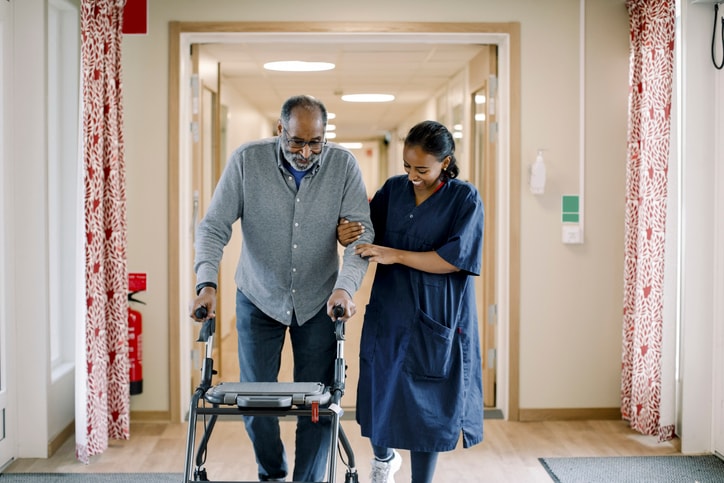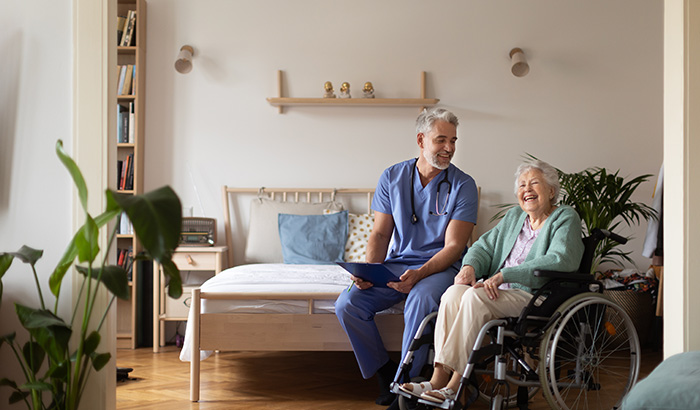Just How Helped Living Improves Self-reliance and Lifestyle
Helped living facilities are created to cultivate self-reliance while dramatically boosting the high quality of life for their locals. By advertising individual option in day-to-day activities and giving tailored treatment strategies, these settings permit individuals to maintain autonomy over their routines and social interactions. Additionally, access to crucial services and possibilities for social involvement adds to a sense of neighborhood and well-being. Yet, the question remains: how do these aspects operate in performance to develop a supportive atmosphere that prioritizes both self-respect and health and wellness? Exploring this communication reveals much deeper understandings into truth impact of assisted living.
Promoting Personal Option
Advertising individual selection is essential in assisted living settings, where residents' autonomy and preferences dramatically enhance their top quality of life. By urging people to choose regarding their everyday routines, social interactions, and treatment options, aided living facilities foster a feeling of control that is important for psychological well-being.
Equipping citizens to select their meals, tasks, and even the decor of their home not just values their individuality yet likewise urges engagement and fulfillment. This technique to care recognizes that each citizen has one-of-a-kind demands and needs, helping with an extra personalized living experience.

Including individual selection right into assisted living is not merely an issue of choice; it is an essential component of dignity and respect. When homeowners are actively associated with decision-making processes, they are extra most likely to really feel valued and purchased their community, ultimately bring about improved total health and happiness.
Access to Essential Services
Access to necessary services plays an essential function in improving the overall quality of life for locals in nursing home. These services include healthcare, drug monitoring, transportation, and daily living assistance, all of which are essential for keeping independence and well-being.
Healthcare solutions, including normal examinations and access to specialized medical treatment, make sure that citizens get prompt interventions for health issues. This aggressive technique to wellness administration promotes autonomy and encourages people to make educated choices concerning their treatment. In addition, medication monitoring services assist homeowners follow their prescribed routines, minimizing the threat of difficulties and promoting general health.
Transportation solutions promote access to essential consultations, social tasks, and area resources, enabling residents to stay engaged and active participants in their lives. Help with day-to-day living tasks, such as showering, dressing, and meal preparation, allows individuals to keep dignity while getting the necessary support.
Social Involvement Opportunities
Social involvement possibilities are necessary for promoting a feeling of community and belonging among residents in assisted living facilities. These possibilities not just battle feelings of isolation and seclusion yet likewise motivate cognitive excitement and emotional health.
Aided living neighborhoods often provide a series of activities created to cater to diverse rate of interests and abilities. From arranged team getaways to crafts and arts sessions, residents can choose from various programs that line up with their choices. Routine gatherings, such as game nights, flick testings, and themed parties, create an inviting environment, enabling homeowners to Charlotte Senior Care attach and form purposeful connections.
Furthermore, several facilities assist in intergenerational programs, where citizens can involve with more youthful individuals, such as volunteers or students. Such interactions improve the lives of both events, promoting compassion and understanding throughout generations.
In addition to organized tasks, casual events in public areas urge spontaneous interactions, even more improving social bonds (Charlotte Alzheimer's Care). These involvement opportunities are crucial in advertising locals' psychological and mental wellness, eventually adding to a better of life and better self-reliance within the encouraging environment of assisted living
Safety and Safety Steps
While social engagement possibilities play an essential role in enhancing residents' lifestyle, guaranteeing their safety and security continues to be a top priority in nursing home. These settings are developed with various safety and security steps to secure homeowners from potential risks. Protected access and leave factors, together with monitoring systems, aid prevent unauthorized accessibility, making sure that locals can enjoy their freedom without jeopardizing their wellness.
Helped living facilities usually include features such as emergency situation telephone call systems, which permit citizens to summon assistance at any time. Furthermore, personnel are educated to respond and acknowledge to emergency situations, giving tranquility of mind for both residents and their households. Regular security analyses are performed to recognize and alleviate risks, even more promoting a secure living atmosphere.
In addition, these facilities usually stick to rigorous safety and security guidelines and criteria, making certain that all aspects of resident treatment prioritize their health and wellness. This dedication to safety and security not only enhances citizens' self-confidence in their environments yet additionally cultivates a feeling of area where people feel sustained and protected. Charlotte Assisted Living. Ultimately, the assimilation of security and protection steps is essential in aiding homeowners keep their self-reliance while appreciating a high top quality of life
Personalized Treatment Strategies
Customized treatment plans are necessary elements of individualized assistance in nursing home, making sure that each citizen's one-of-a-kind demands and preferences are satisfied. These strategies are created with thorough assessments performed by medical care professionals, that review numerous variables such as clinical background, physical capacities, social interaction, and personal preferences.
The development of a tailored care plan involves partnership between locals, their family members, and the care group. This collective approach advertises openness and guarantees that all celebrations are lined up with the homeowner's objectives for their treatment and way of life. The care plan may consist of help with daily activities, medicine management, and accessibility to recreational programs, all tailored to enhance the resident's freedom while ensuring their security and wellness.
Ultimately, personalized treatment strategies not only enhance the quality of life for residents but also promote a sense of freedom, enabling people to flourish within an encouraging neighborhood. This customized approach exemplifies the commitment of assisted living facilities to support dignity and improve self-reliance amongst their citizens.
Verdict
In conclusion, helped living substantially enhances freedom and lifestyle for homeowners by prioritizing personal selection and autonomy in day-to-day tasks. The arrangement of important solutions, combined with chances for social interaction, fosters a feeling of community and mental health. Security and security steps, together with tailored treatment strategies tailored to private needs, make certain that homeowners obtain appropriate support while maintaining self-respect. Eventually, assisted living produces a setting where individuals can flourish and lead meeting lives.

Eventually, personalized treatment plans not only enhance the high quality of life for locals yet additionally cultivate a sense of freedom, enabling individuals to grow within a helpful community.